Issue #12 - A Falácia da Gestão de Riscos
Ei!
Estou de volta com uma edição totalmente nova e, acredite, esta tem coisas interessantes! Desde os pequenos riscos sorrateiros no gerenciamento de projetos que podem te atrapalhar, até meu retorno ao Burning Man (sim, de novo!), e até mesmo um passeio em um carro autônomo – foi um mês e tanto!
Também estou me aprofundando em alguns tópicos importantes, como agentes de IA, bioacústica e falácias lógicas que podem atrapalhar seu raciocínio. Ah, e se você gosta de gerenciamento de projetos, há grandes novidades em nossa Certificação em Gerenciamento de Projetos de IA e na última masterclass do ano.
Como sempre, é um prazer compartilhar isso com vocês e espero que gostem de ler tanto quanto eu gostei de escrevê-lo!
Saúde,
Ricardo
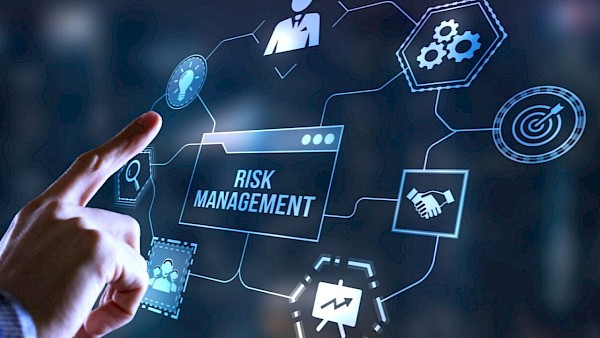
In This Issue
- Why Small Issues Are Just as Dangerous as Big Ones
- Back to Burning Man
- The Rise of Autonomous Vehicles: Waymo in the Spotlight
- Unpacking Logical Fallacies: The Sneaky Tricks in Reasoning
- PMI Summit 2024
- The Emergence of AI Agents: Virtual Assistants on the Rise
- Framework Convention for AI
- Bioacoustics
- AI Project Management Certification
- Last “Revolutionizing Projects” AI Masterclass of the Year!
- Venture Lab
- Save the Date: Angola Workshop Launch
Why Small Issues Are Just as Dangerous as Big Ones
When we talk about risk management in project management, our minds often jump to large, catastrophic events.
We picture scenarios like natural disasters, major accidents, or other significant crises that could derail a project.
And it’s natural to focus on these — they’re huge, impactful, and often make us feel like they’re the only real threats to our project’s success.
But here’s where we, as project managers, sometimes get it wrong.
According to a report by the Project Management Institute (PMI) from 2023, 52% of project failures are caused by small, avoidable issues, such as poor communication, unclear objectives, or delays in decision-making.
While large events can certainly disrupt a project, they’re often not the reason we miss deadlines, blow budgets, or fail to meet expectations.
What usually causes trouble in our projects are the small, seemingly insignificant issues that pile up over time.
Think of it like water dripping from a ceiling… one drip won’t do much, but over time, those drips add up and can cause real damage.
These small events, like an unclear email, a delayed report, or a poorly run meeting, are often overlooked because they don’t feel as urgent or dangerous as the big risks.
However, when these issues happen consistently, they slowly erode the foundation of the work we are trying to accomplish.
They can lead to confusion, missed deadlines, or miscommunications, and eventually create a much bigger problem than any single large event could.
And many times when we notice this, it is too late…
It’s important to broaden our perception of risk as project managers.
The Probability Impact Matrix
A useful way to think about this is through the lens of the risk probability-impact matrix that all of us in the project management field use.
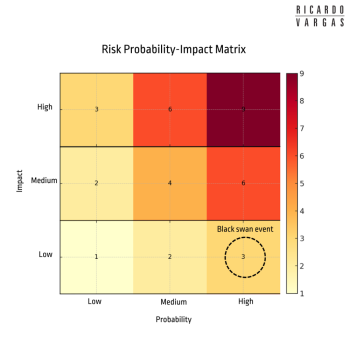
The Probability Impact Matrix
We often get hung up on risks that have a high impact, even if they have a low probability of happening.
It is called the “catastrophe or black swan” mindset.
But what about those low-impact, high-probability events?
If these frequent, low-impact events that we often ignore become a constant in our project, they can make our lives miserable and dramatically reduce the chances of delivering our project successfully.
Just think about how frequently you were interrupted today, constantly being dragged into pointless and irrelevant meetings, phone calls, messages, and emails.
Each time you tried to focus on your work, another notification popped up, pulling your attention away from what truly matters. It wasn't just the big, obvious distractions but also the subtle interruptions—the quick questions from colleagues, the unnecessary status updates, the emails that could have waited—that collectively consumed your time.
By the end of the day, you realized that despite being busy all day, you had moved the project forward by close to nothing. It's frustrating to know that your energy was spent on tasks that didn't contribute to your goals.
The sense of accomplishment that comes from making significant progress was replaced by a lingering dissatisfaction and the weight of unfinished work. ☹️
What can you do to avoid being trapped by these small events?
Of course, it is easier to point out these problems and challenges.
But how we can tackle the challenge to strike a balance between resolving large-scale risks and managing the daily issues that can erode project performance over time?
Here are some actions project managers can take to prevent minor issues from becoming major risks:
Conduct daily check-ins: Host brief daily stand-up meetings to review progress and address any minor issues before they escalate. This ensures that small concerns are raised early and dealt with promptly.
Implement a risk escalation process: Establish a clear protocol for escalating small problems. Encourage the team to raise concerns as soon as they arise, even if they seem minor, to avoid delays or confusion later.
Track minor risks separately: Create a dedicated section in the risk register to track smaller issues. This way, they are documented and reviewed regularly, ensuring they don’t slip through the cracks. Of course, this risk register can be a much simpler register than the full analysis you may do for more relevant risks in your project. Even a simple list can already help us handle them in our daily check-ins.
Schedule buffer time: Build some flexibility into the project timeline to accommodate minor delays or adjustments. This prevents smaller issues from derailing key milestones or deliverables. I have loved the concept of buffer time since I learned Critical Chain for the first time. It is a magical concept.
Foster accountability: Assign ownership of smaller tasks and risks to specific team members. By holding individuals accountable for managing and resolving these issues, we ensure they are addressed consistently.
Regularly review communication channels: Make sure communication flows smoothly, and that information is clear and actionable. Poor communication is often at the root of small, frequent issues that slow down progress.
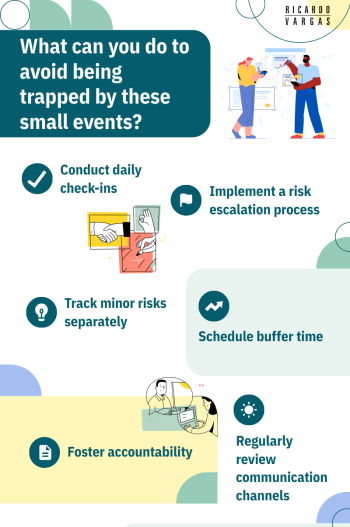
What can you do to avoid being trapped by these small events?
By taking these actions, we can prevent the snowball effect from minor problems that, if ignored, could lead to major setbacks.
Don’t just brace yourselves for the big challenges—focus on the small ones as well.
They often hold the power to define our projects’ success.
Back to the Burning Man
It’s hard to believe, but I was back at Burning Man in 2024!
After last year’s experience (which I shared with you here), my wife and I returned to the dusty expanse of Black Rock City for another Burning Man adventure this year.
The question I heard most from friends and colleagues was: “Why are you going back?”
For me, Burning Man is about experiencing a different life within my own. For ten days, I immersed myself in art, electronic music (even though it’s not really my thing), and, most importantly, lived alongside people who have chosen to live in radically different ways than I do.

Sadly, we currently live in a world of “tribes.” We are not open to talking and accepting that some people have different beliefs and perspectives on life.
People naturally gravitate towards others who share similar thoughts, seeking comfort and validation in like-mindedness. It reminds me of the Brazilian singer Caetano Veloso, who said, “Narcissus shies away from look-unalikes.”
It is hard to accept and understand what is different from us.
But it is essential.

Burning Man 2024
This openness is crucial not only on a human level but also professionally. As project managers, we are tasked with developing products, services, and ideas that will change behaviors and challenge conventional thinking.
And innovation inevitably faces resistance.
You cannot succeed in creating something new if you’re locked in your own perspective.
For me, going back was about stepping out of my comfort zone and seeking out experiences that help me see the world — and, by extension, my projects — from a fresh angle.
I’m not trying to convince you to join me at Burning Man next year :)
I am only encouraging you to find your own way to step outside your comfort zone and embrace what is uncomfortable.
The most impactful insights are often hidden in that unopened box you’ve yet to explore.
You just need to open it.
What Has Been on My Radar Recently?
The Rise of Autonomous Vehicles: Waymo in the Spotlight
Yes, it's true: I rode in an autonomous car!! And it was amazing!
Autonomous vehicles represent a monumental shift in technology and transportation.
Waymo, a leader in this field, has been at the forefront of developing self-driving technology.
Their vehicles are equipped with sophisticated sensor arrays, including LIDAR, cameras, and radar, which allow them to navigate roads and make real-time decisions with remarkable precision.
The complexity of this technology cannot be overstated. It involves integrating advanced algorithms with hardware capable of interpreting a vast range of data points—from traffic signals to pedestrian movements.
I shared the whole experience on my social networks:
The advancements Waymo is making are not just incremental but transformative.
They have the potential to redefine how we think about mobility and safety on the roads.
Unpacking Logical Fallacies: The Sneaky Tricks in Reasoning
Logical fallacies are crucial to understand, especially in today’s information-rich world.
They are errors in reasoning that can weaken arguments and mislead audiences.
On the other day I made a post about it on my LinkedIn, Instagram and Facebook.
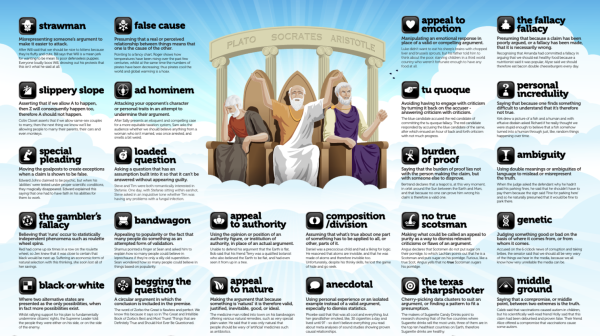
Recognizing these fallacies can enhance our critical thinking and improve our ability to communicate effectively.
For instance, the “straw man” fallacy involves misrepresenting someone’s argument to make it easier to attack.
Another example is the “post hoc” fallacy, where one assumes that because one event followed another, the first caused the second.
Learning to spot these tricks is essential for navigating debates and discussions more clearly.
The website Your Logical Fallacy Is offers a great resource for identifying and understanding these flaws in reasoning.
PMI Summit 2024
In September I also attended the PMI Summit 2024, in Los Angeles.
This is the premier event for project management professionals globally.
Having attended every PMI Global Event since 1998, I can say it’s an unparalleled opportunity to connect with peers, share knowledge, and gain insights into the latest trends and methodologies in project management!!
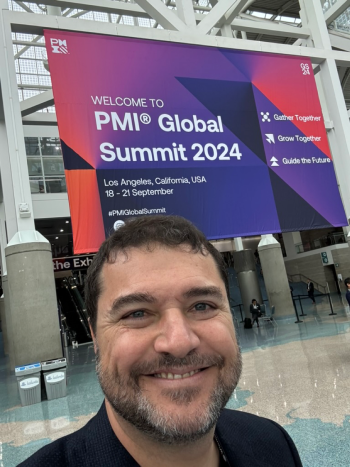
For me, this summit is not just about attending sessions… it’s a chance to see old friends, engage with a community of experts, exchange ideas, and gain new perspectives.
I’m looking forward to being back next year!
Mark in your calendars: November 12 to 15, 2025, in Phoenix, Arizona.
The Emergence of AI Agents: Virtual Assistants on the Rise
fI saw an article the other day on Forbes about AI agents, which are becoming increasingly integral to our daily lives.
These virtual assistants, which range from smart home devices to sophisticated business tools, are designed to help with a variety of tasks, from managing schedules to providing information on-demand.
They do not only answer to your request. They “execute it.”
For me, they are the next frontier of what we will see in the upcoming months in AI.
Stay tuned for the avalanche of AI Agents that will come, including in Project Management.
Framework Convention for AI
I recently heard about the Council of Europe’s Framework Convention on Artificial Intelligence, and it really stood out to me.
It's actually the first legally binding treaty on AI, which is pretty significant because it focuses on making sure AI development respects key principles like human rights, democracy, and the rule of law.
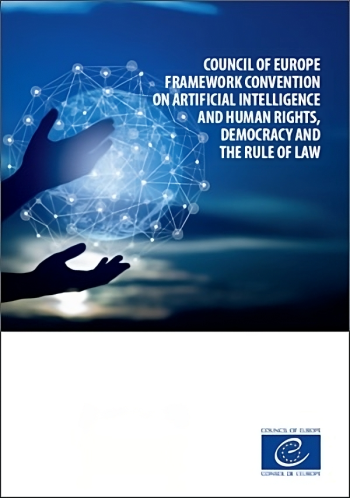
Council of Europe’s Framework Convention on Artificial Intelligence
One of the big advantages of this convention is that it creates a framework within which AI can keep evolving while maintaining ethical safeguards.
As AI advances, this kind of oversight helps ensure that progress happens in a way that upholds our fundamental values.
If you’re curious, you can check out more information from the Council of Europe. It is only 12 pages, and it will give you insights into how governments and society perceive AI's risks.
Bioacoustics
I’m not sure if you’ve heard about it, but I find the field of bioacoustics fascinating.
Bioacoustics is an emerging field that explores how sounds produced by the body can provide valuable health insights.
For example, subtle variations in cough sounds can indicate the presence of respiratory conditions like tuberculosis.
Google’s Health Acoustic Representations (HeAR) project is at the forefront of this innovation.
By analyzing vast amounts of audio data, including cough sounds, HeAR aims to develop models that can detect early signs of disease with high accuracy.
This approach has the potential to revolutionize health diagnostics, making it easier to monitor and manage various conditions using widely available smartphone technology.
You can learn more about this groundbreaking research here.
Quick Announcements
AI Project Management Certification
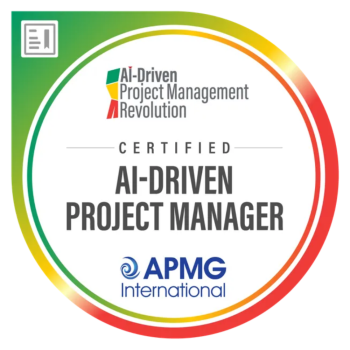
Antonio Nieto-Rodriguez and I are thrilled to announce the launch of our AI Project Management (AIPM) Certification in partnership with APMG International, the global leader in accreditation.
The certification was released to the public on September 17, 2024!
This groundbreaking credential is set to transform how project managers integrate AI into their projects.
The exam is closed-book and proctored, ensuring it validates your expertise. But this certification is more than just a credential; it’s about creating a movement. We’re building a community where project managers are empowered with the knowledge to drive AI-powered projects to success.
We are getting close to the first 100 credentials issued.
You can learn more about the certification here.
If you’re passionate about the future of project management, this certification is for you!!
Last AI-Driven PM Revolution Masterclass of the Year
This is your last chance to join Antonio and me in our last Masterclass of 2024!!
In the masterclass, we’ll explore the latest AI trends reshaping project management.
From practical insights to futuristic perspectives, believe me: this will be an epic session to close the year.
Register now to secure your spot!!
More information and registration here.
Spaces are limited, so don’t miss out!
Save the Date: New Workshop Launch Directly from Luanda-Angola
Last but not least, I’m excited to announce that on October 22nd, I’ll launch a brand-new workshop directly from Luanda-Angola!
This new workshop will join the family of PMDome, PMRank, Uncertanty Cycle and PMFits.
This is a huge milestone for me, and I can’t wait to share more details soon.
Stay tuned and follow me on LinkedIn for updates on this exciting event.
PS: this workshop is not about Artificial Intelligence.
Your Voice Matters!
You can also read the previous issues here.
If you have any suggestions, comments, or anything else to help me improve the e-newsletter, please message [email protected]. I would love to hear from you.
Please share this newsletter with your friends, colleagues, and other people you may find will benefit from it.
They can also subscribe to receive it here.
Thanks for your support, and I hope it was helpful to you.
Cheers,
Ricardo

